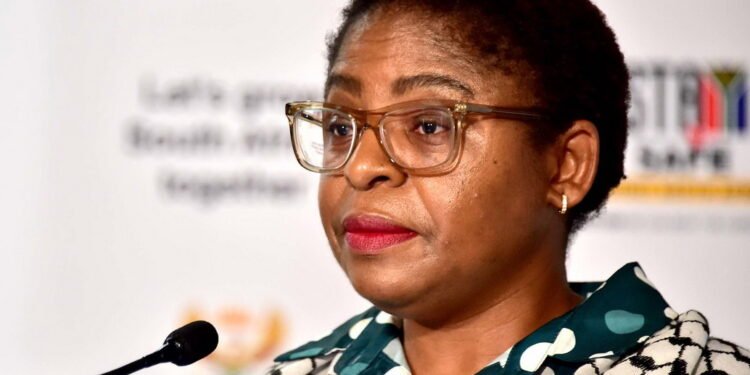
Two Democratic Alliance (DA) Members of Parliament (MPs) maintain Minister in the Presidency, Khumbudzo Ntshavheni, prevented them from performing oversight at the Directorate Conventional Arms Control (DCAC).
The “blocking”, Chris Hattingh and Nicolas Gotsell said in a statement, was by way of “a telephonic instruction” from Ntshavheni to Peter Mashaba, DCAC Acting Director. Her “effort to avoid accountability” will see Ntshavheni reported to Parliament’s ethics committee.
The DA MPs, part of President Cyril Ramaphosa’s 10 party government of national unity (GNU), have it the Minister in The Presidency has no right to block other elected representatives from executing their oversight functions.
Making matters worse, the pair said their “undemocratic obstruction”, was exacerbated by South Africa’s senior soldier, SA National Defence Force (SANDF) Chief, General Rudzani Maphwanya. He, according to the Gotsell/Hattingh statement, “personally intervened to block our visit”.
“We were kept waiting for over an hour before General Maphwanya arrived with Acting Director Mashaba, questioning how we had gained access to the premises [the Armscor Building in Pretoria] and demanding written authorisation from the Minister of Defence [and Military Veterans, Angie Motshekga].
“This is in direct contradiction to President Cyril Ramaphosa’s recent State of the Nation Address (SONA), where he emphasised the government’s commitment to good governance and a capable state.
“We also reiterate our call that Ministers under criminal investigation or awaiting prosecuting by the National Prosecuting Authority (NPA) should not be in Cabinet,” they point out in support of Ntshavheni’ s apparent involvement in alleged financial wrongdoing while she was Ba-Phalaborwa Municipal Manager.
Explaining the reason for the DCAC visit, Gotsell told defenceWeb that South Africa has a long history of arms and conventional weapons manufacturing – an industry that creates jobs and contributes to the economy, but is increasingly under strain. Amid a repressed domestic market, many of these companies focus specifically on the export of their produce. However, the defence industry has consistently raised concerns which relate directly to the operation of the National Conventional Arms Control Committee (NCACC) and the DCAC. These concerns include the timeous processing of permit applications, delays in the review or amendment of the NCACC Act which it considers not be pro-growth and the administrative and operational challenges within the DCAC.
“The DA has received reports from several industry businesses detailing billions of Rands’ worth of outstanding permits and its oversight visit was meant to interrogate the administrative and operational challenges which includes a severe delay in introducing an electronic permit application system, failure by DCAC officials to answer phones and their apparent lack of discipline in working hours and work attendance,” Gotsell said.
“It is worrying that the ANC are blocking oversight over critical defence-related issues; first the co-chairpersons of the Joint Standing Committee on Defence prohibited members from exercising their oversight right when they protected Minister Motshekga from answering questions when she appeared before the JSCD on 4 February; now Minister Ntshaveni simply issues a decree which prohibited Hattingh and myself from doing our job. What happened to the capable, ethical state President Ramaphosa reiterated in his State of the Nation Address?” Gotsell asked.
Inappropriate intervention
“It seems highly inappropriate to me that Maphwanya, as Chief of the SANDF, would intervene in this issue as the Directorate for Conventional Arms Control does not fall under his constitutionally-assigned authority,” African Defence Review Director Darren Olivier told defenceWeb.
“South Africa, like any liberal democracy, has strict civilian control over the military and limits the powers of the uniformed chief of the armed forces. In South Africa’s case, that means there’s a civilian Minister of Defence & Military Veterans, and a civilian Department of Defence with an accompanying Defence Secretariat that’s headed by a civilian Secretary for Defence.
“The SANDF is merely one component of the Department of Defence, and as its chief Maphwanya does not have any authority over functions and entities that exist within the DOD Secretariat or other parts of the DOD. That includes Armscor and the DCAC, who report only to the Secretary for Defence and the Minister of Defence and Military Veterans,” Olivier explained.
He said it is “a worrying indication of a blurring of crucial civilian-military dividing lines for the Chief of the SANDF to be intervening to prevent duly elected Members of Parliament from accessing DOD entities like the DCAC which do not fall under his authority.”
There was, at the time of publishing, no response to the blocking from The Presidency.










